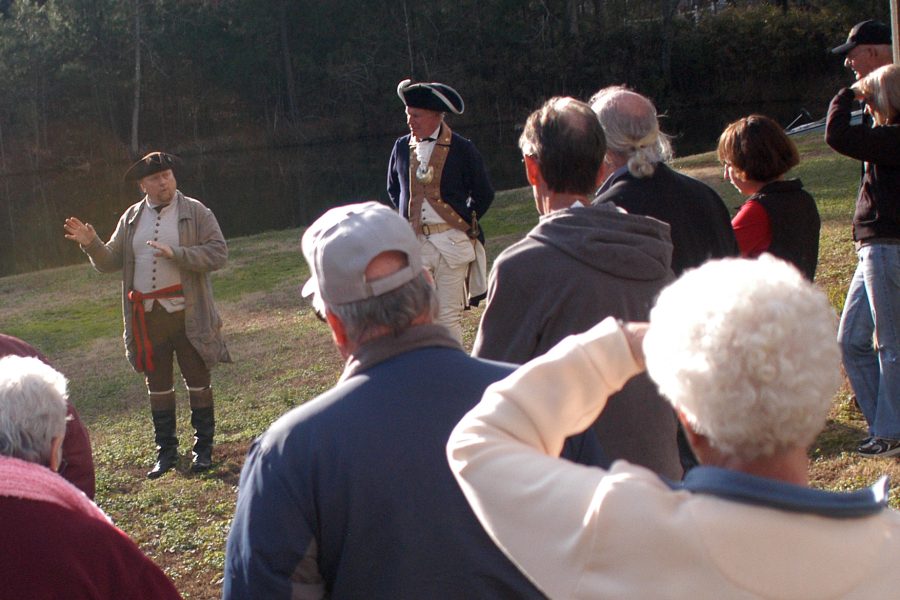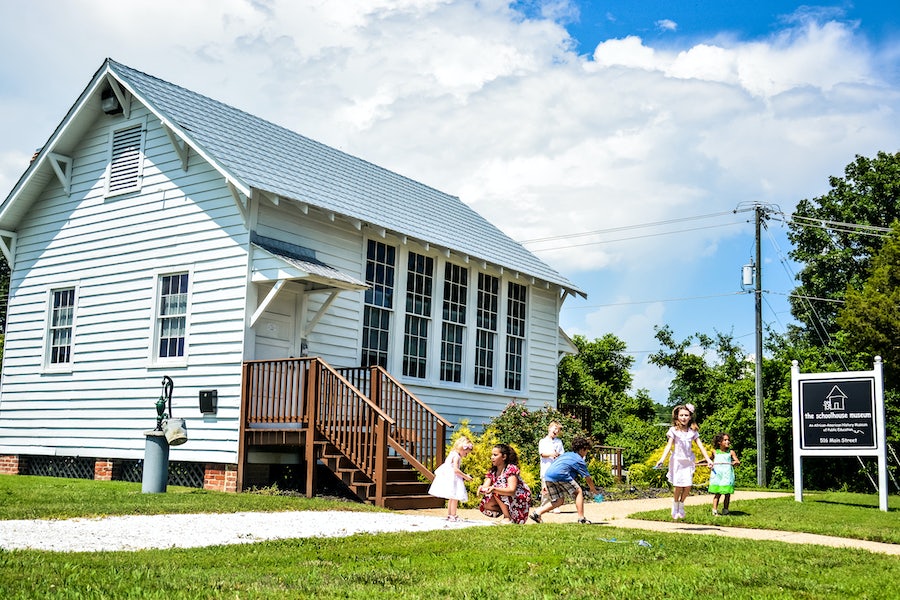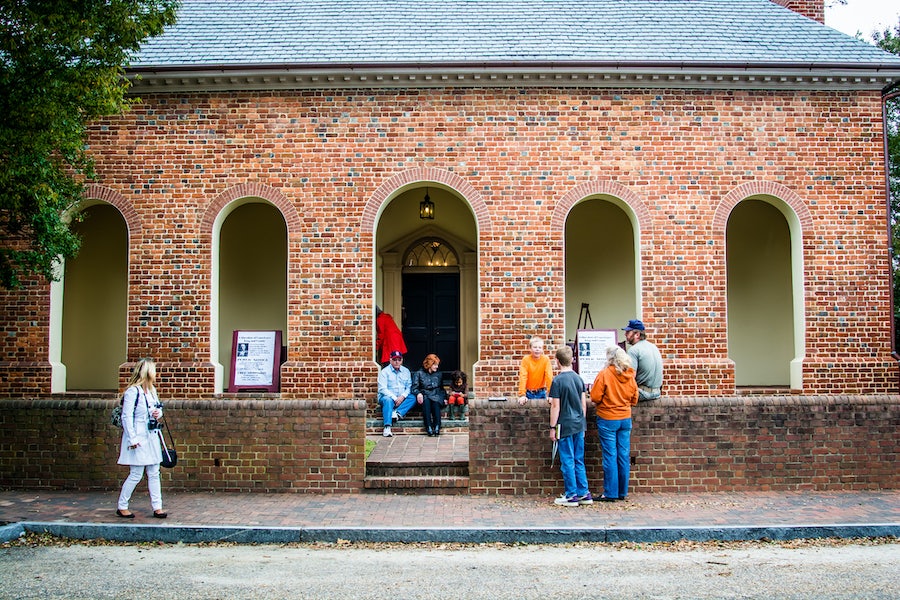




Committees of Safety Created at the 1750 Courthouse
Beginning in 1775, local patriots under the direction of the appointed county magistrates, formed committees of safety to organize local militia units and secure supplies of powder and ball ammunition. Militia leader Josiah Parker of Macclesfield, among other notables with military and maritime experience, presided over these meetings to prepare Isle of Wight County citizens in the event Crown Forces appeared. As the current royal government court structure in the county, the 1750 Courthouse building served as the venue for these revolutionary assemblies.
Militia Musters on the Courthouse Green
Lot 33 of the original 1750 Smithfield land use plat lying directly across the street from the 1750 Courthouse was designated as the courthouse green. On monthly court days the major activity here was the assembly of purveyors of the many excess products produced on local farms. This one-acre green was also the primary assembly area for the local colonial militia when mustered. During the Revolutionary War, units came here to train in the techniques of 18th century tactical warfare.
Fort Boykin
Originally fortified in 1623, this strategic promontory on Burwells Bay was significantly reconstructed in 1776 as an extensively fortified earthwork to deter and defend against British naval incursions up the James River. Royal Navy warships never threatened the fort, named in honor of local patriot leader Francis Boykin. Refortified in 1812 for America’s “Second War of Independence,” Fort Boykin played a major role in defeating several British landings. This defensive work was again rebuilt and strengthened in 1861 to serve as a strongpoint protecting against Union Navy riverine advances toward Richmond. Following four naval gunfire assaults in May of 1862, Confederate forces were withdrawn when the position was deemed no longer necessary.
Benedict Arnold’s Campground at Pierceville
After landing at Hardy’s Ferry on Lawne’s Neck on January 14, 1781, and following skirmishes at Flowerdew Hundred and Cobham Wharf, Benedict Arnold’s army of some 800 regulars, loyalists and Hessian “Jaeger” encamped on the grounds of Pierceville, the home of one of Isle of Wight County’s most prominent landholders, Thomas Pierce.
Mackie’s Mill Skirmish
In January 1781, Benedict Arnold, in command of some 800 British regulars, loyalists and Hessian auxiliaries, appeared in the Chesapeake Bay after sailing from New York. Ordered to disrupt local patriot operations, he proceeded up the James River, burned the recently established capital in Richmond and returned down the river, moving overland to secure the port of Portsmouth. Debarking his small army north of Smithfield on the 15th of January, Arnold encamped on the edge of town. Early the next day he continued his march toward Portsmouth. His right flank element encountered the 200-strong Isle of Wight Militia force under Colonel Josiah Parker at the site of Mackie’s Mill. Resistance by the militia caused Arnold to employ his German riflemen against Parker’s two small cannon crews with devastating effect. Suffering unacceptable casualties, Parker ordered a withdrawal by his greatly outnumbered forces. Arnold continued his advance, capturing several Isle of Wight County Militia soldiers. Despite the brave delay tactics of local militia, Benedict Arnold achieved his objective of occupying Portsmouth. His army reembarked and returned to New York.
Captain Pierce Captured Near Wrenn’s Mill
According to the journal of Hessian Captain Johannes Ewald, the owner of Pierceville was captured near Wrenn’s Mill on January 15, 1781. Militia Major Thomas Pierce of Pierceville was reconnoitering alone the approach of Benedict Arnold’s invading force when he was captured by one of Ewald’s riflemen. This lucky Hessian auxiliary soldier, under military protocols, became the beneficiary of the “booty” of 1,000 pds. paper money, a fine gold watch and a beautiful horse.
Arnold’s Regiment Crosses Red Point Bridge
On the morning of January 16, 1781, Benedict Arnold sent his 200 strong 80th Regiment of foot soldiers across wooden Red Point Bridge to engage reported patriot militia units along the Pagan River. They continued along the east shore of Cypress Creek to threaten Colonel Josiah Parker’s Isle of Wight County Militia who were blocking Arnold’s planned route to Portsmouth. This small bridge at the east foot of Water Street (now South Church Street) was the only access to the Red Point area on the other side of Cypress Creek and areas east of the new (1750) Town of Smithfield.
John Sinclair House
At 335 South Church Street in Smithfield stands the home of local Revolutionary War patriot and notable privateer John Sinclair. Using letters of marque and reprisal, he waylaid and captured many English ships bound for the colonies to resupply his majesty’s forces. He is noted for carrying much needed ammunition to the American Army and piloting the French Fleet through the capes into the York River. This site is also notable for the post-Revolutionary War confrontation between Sinclair and Brigadier General (later Chief Justice) John Marshall. On July 22, 1794, Marshall led a troop of cavalry up to the front of this house in a failed attempt to arrest Sinclair for supposedly continuing his wartime escapades.
Reynolds Drive
The twisting and narrow Reynolds Drive is listed on 18th century maps as the “Road to Smiths Neck.” It was this route that British troops reportedly marched along to reach Colonel Josiah Parker’s home of Macclesfield under orders to destroy it. The record is unclear, but a report indicates the British troops decided not to burn the Parker home when they found only his family there – not him.
Macclesfield
Named for the Parker Family’s home estate in England, Macclesfield plantation was a 1638 land grant by King Charles I to Josiah Parker’s great-great grandfather. Macclesfield remained the Parker residence during the Revolutionary War when Josiah Parker served under George Washington commanding the Fifth Virginia Regiment in the battles of Trenton, Princeton and Brandywine Creek. The family cemetery still stands near where Macclesfield once was and Josiah Parker himself is reportedly buried there along with the ceremonial sword accepted from Hessian Colonel Johannes Rawl on December 26, 1776, following their surrender after the Battle of Trenton, New Jersey.
Mallory Todd House
Although not a member of the Continental Navy, shipping merchant Mallory Todd of Smithfield was a significant provider of provisions and supplies to the patriot Continental forces. His home still stands in the Town of Smithfield and was once his base of operations as his shipping interests expanded to meet the demands of supply for local patriot forces. He is recognized by the Sons of the American Revolution as a significant contributor to the Revolutionary cause. He is buried in a marked gravesite in the cemetery of the West Parish Church near Wrenn’s Mill in Isle of Wight County.
Saving of the Courthouse Records
During the Revolutionary War, upon hearing that British Lt. Col. Banastre Tarleton was nearing Smithfield, Elizabeth Bennett Young hid the county’s court records in a trunk and buried them on a nearby farm until the war’s end. Young, the wife of Deputy Clerk Lt. Francis Young, protected what are now some of the oldest and most complete court records in the United States.
 Windsor Castle Walking Tour
Windsor Castle Walking TourFrom the site's pre-colonial existence to the present day, Windsor Castle tells the fascinating history of the development of Smithfield. Join us for ... Read More
 Patriotic Privateers: License to Steal
Patriotic Privateers: License to Steal At the outbreak of the Revolution, American seaports were filled with merchant ships and crews. With no navy, the Continental Congress and individual ... Read More
 LUNCH & LEARN: Happy Birthday, Robert Barraud Taylor!
LUNCH & LEARN: Happy Birthday, Robert Barraud Taylor!Celebrate the birthday of this War of 1812 hero born in 1775 in Smithfield. Commander of all U.S. military forces in the Norfolk area in 1813, Taylor ... Read More
 God of the Tories: How British Clergy made the case against the Revolution
God of the Tories: How British Clergy made the case against the RevolutionThey say history is written by the winners but the perspective of the losers can also tell us as much about the events of the past. In this lecture Jo... Read More
 Quarterly Artists Invitational
Quarterly Artists Invitational St. Luke’s Historic Church & Museum in beautiful Smithfield, VA, has invited local and regional artists of all ages to take part in our Quarterl... Read More
 Isle of Wight Courthouse Complex Walking Tour
Isle of Wight Courthouse Complex Walking TourJoin us as we explore this 19th, 20th and 21st century site and share the story of its beginnings as well as a few tales of capers and duels. This tou... Read More
 Cemetery Preservation Workshop
Cemetery Preservation Workshop Join St. Luke’s Staff as we get our hands dirty. The Cemetery Preservation Workshop is a free program designed to educate volunteers on the necessar... Read More
 Windsor Castle Walking Tour
Windsor Castle Walking TourFrom the site's pre-colonial existence to the present day, Windsor Castle tells the fascinating history of the development of Smithfield. Join us for ... Read More
 U.S. Air Force Langley Winds
U.S. Air Force Langley WindsThe Sundays at Four concert season provides a minimum of three professional concerts, and three opportunities for young musicians (Recital for 6 audit... Read More
 LUNCH & LEARN: Happy 275th Birthday, Josiah Parker!
LUNCH & LEARN: Happy 275th Birthday, Josiah Parker!Born May 11, 1751, in Isle of Wight County, Josiah Parker was an American politician, Revolutionary War officer, local militia commander, member of th... Read More
 SHS Choraliers Choral Showcase-Spring Concert Series
SHS Choraliers Choral Showcase-Spring Concert Series Enjoy the award-winning voices of the Smithfield High School Choraliers in the Old Brick Church. Tickets will be available for in-person or virtual at... Read More
 Un/Bound: Free Black Virginians, 1619-1865
Un/Bound: Free Black Virginians, 1619-1865This traveling exhibit from the Virginia Museum of History & Culture explores the lives of free Black Virginians from the arrival of the first captive... Read More
 Cemetery Preservation Workshop
Cemetery Preservation WorkshopJoin St. Luke’s Staff as we get our hands dirty. The Cemetery Preservation Workshop is a free program designed to educate volunteers on the necessar... Read More
 Summer Series Part I: Freedom for Whom? Lord Dunmore's Proclamation and the Revolution in Virginia
Summer Series Part I: Freedom for Whom? Lord Dunmore's Proclamation and the Revolution in VirginiaThe American Revolution dramatically altered the meaning of "liberty," and Dunmore’s November 1775 proclamation exposes the Revolution’s contradic... Read More
 Divided over the Declaration
Divided over the Declaration On the 250th anniversary of the Declaration of Independence comes a gripping chronicle of America’s fiercest ideological debates over the document�... Read More
 Windsor Castle Walking Tour
Windsor Castle Walking TourFrom the site's pre-colonial existence to the present day, Windsor Castle tells the fascinating history of the development of Smithfield. Join us for ... Read More
 During the Several Invasions of the Enemy
During the Several Invasions of the EnemyThe Virginia Publick Claims are historical records from the Revolutionary War era detailing the goods and services that Virginians provided to the Con... Read More
 Sail250 Walking Tours of South Church Street
Sail250 Walking Tours of South Church StreetIn conjunction with the Sail250 maritime festival of tall ships and military ships to celebrate the 250th Anniversary of the founding of the United St... Read More
 Cemetery Preservation Workshop
Cemetery Preservation WorkshopJoin St. Luke’s Staff as we get our hands dirty. The Cemetery Preservation Workshop is a free program designed to educate volunteers on the necessar... Read More
 Summer Series Part II: A World in Motion: Indigenous Nations and the American Revolution
Summer Series Part II: A World in Motion: Indigenous Nations and the American RevolutionFor Indigenous nations, the Revolution was not primarily a fight over abstract political rights, but a battle for land, sovereignty, and survival - of... Read More
 LUNCH & LEARN: John Sinclair v. General John Marshall, 1794
LUNCH & LEARN: John Sinclair v. General John Marshall, 1794Today is the 232nd anniversary of the town's confrontation between accused privateer John Sinclair and U.S. Cavalry commander John Marshall, future Ch... Read More
 Quarterly Artists Invitational
Quarterly Artists Invitational St. Luke’s Historic Church & Museum in beautiful Smithfield, VA, has invited local and regional artists of all ages to take part in our Quarterl... Read More
 Windsor Castle Walking Tour
Windsor Castle Walking TourFrom the site's pre-colonial existence to the present day, Windsor Castle tells the fascinating history of the development of Smithfield. Join us for ... Read More
 Summer Series Part III: Revolution from Below: Debtors, the Landless, and the Common People
Summer Series Part III: Revolution from Below: Debtors, the Landless, and the Common PeopleMuch of the Revolution’s radical energy came not from elites but from ordinary people crushed by debt, taxation, and land scarcity. Understanding th... Read More
 Isle of Wight Courthouse Complex Walking Tour
Isle of Wight Courthouse Complex Walking TourJoin us as we explore this 19th, 20th and 21st century site and share the story of its beginnings as well as a few tales of capers and duels. This tou... Read More
 Cemetery Preservation Workshop
Cemetery Preservation WorkshopJoin St. Luke’s Staff as we get our hands dirty. The Cemetery Preservation Workshop is a free program designed to educate volunteers on the necessar... Read More
 BORN FROM CONFLICT: a 17th-Century Living History Event
BORN FROM CONFLICT: a 17th-Century Living History Event This immersive 17th-century living history event that transports visitors back into the world of early colonial Virginia. This family-friendly program... Read More
 BORN FROM CONFLICT: a 17th-Century Living History Event
BORN FROM CONFLICT: a 17th-Century Living History Event This immersive 17th-century living history event that transports visitors back into the world of early colonial Virginia. This family-friendly program... Read More
 Cemetery Preservation Workshop
Cemetery Preservation WorkshopJoin St. Luke’s Staff as we get our hands dirty. The Cemetery Preservation Workshop is a free program designed to educate volunteers on the necessar... Read More
 LUNCH & LEARN: Chickens & Cows & Pigs, Oh My: Virginia's Early Colonizers
LUNCH & LEARN: Chickens & Cows & Pigs, Oh My: Virginia's Early ColonizersWhen the English colonists arrived in the New World in 1607, they faced significant hardship including the Starving Time of 1609. The drama and humani... Read More
 Twilight Cemetery Tours
Twilight Cemetery Tours They say, "Dead men tell no tales," but we disagree! Come and enjoy the stories of those buried here at St. Luke’s Historic Church & Museum. There a... Read More
 Quarterly Artists Invitational
Quarterly Artists Invitational St. Luke’s Historic Church & Museum in beautiful Smithfield, VA, has invited local and regional artists of all ages to take part in our Quarterly Ar... Read More
 Fort Boykin Walking Tour
Fort Boykin Walking TourFort Boykin has been a part of American history since 1623 when a fort known as the Castle was constructed following the 1622 Indian Attack. It was re... Read More
 Quarterly Artists Invitational
Quarterly Artists Invitational St. Luke’s Historic Church & Museum in beautiful Smithfield, VA, has invited local and regional artists of all ages to take part in our Quarterl... Read More
For more information, please contact:
Patrick Daughtry, Director of Major Gifts
(757) 936-0302 | pdaughtry@va250.org
Susan Nolan, Director of Institutional Giving
(757) 903-1060 | snolan@va250.org
You can see how this popup was set up in our step-by-step guide: https://wppopupmaker.com/guides/auto-opening-announcement-popups/